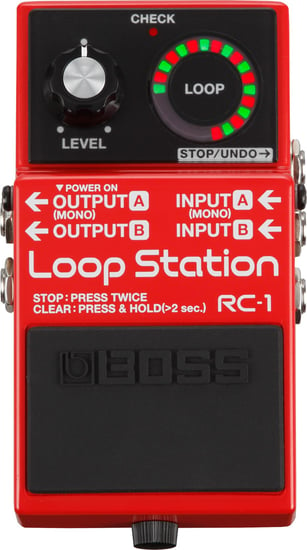Boss RC Loopers & Loop Stations
-

Boss RC-1 Loop Station Pedal Boss RC-1 Loop Station Pedal
In stock
More infowas £120.00£99.00In stock
£99.00was £120.00 -

Boss RC-10R Rhythm Loop Station Pedal Boss RC-10R Rhythm Loop Station Pedal
In stock
More infowas £315.00£249.00In stock
£249.00was £315.00 -

Boss RC-202 Desktop Loop Station Boss RC-202 Desktop Loop Station
In stock
More infowas £358.00£269.00In stock
£269.00was £358.00 -

Boss RC-5 Loop Station Pedal Boss RC-5 Loop Station Pedal
In stock
More infowas £215.00£175.00In stock
£175.00was £215.00 -

Boss RC-500 Dual Track Loop Station Pedal Boss RC-500 Dual Track Loop Station Pedal
In stock
More infowas £311.00£249.00In stock
£249.00was £311.00 -

Boss RC-505 MKII Desktop Loop Station Boss RC-505 MKII Desktop Loop Station
In stock
More infowas £575.00£470.00 -

Boss RC-600 Loop Station Boss RC-600 Loop Station
In stock
More infowas £544.00£449.00In stock
£449.00was £544.00
1
Boss RC Loopers & Loop Stations
Browse our RangeBoss Looper Pedals have become the industry standard for any performer across the world. Boss are the first name you think of when the word “Looper” or “Loop Station” is mentioned and they have built quite the legacy. These little red boxes have adorned the stages of some of the biggest performing artists, seen across streets at the feet of buskers and sitting on the bedroom floor of practising musicians across the globe. Songwriting giants, KT Tunstall, Ed Sheeran and Newton Faulkner all cut their teeth from using Boss Loopers. their live performances perfectly showcase the creative ways loop pedals can be used, and just look at them now!
The art of Looping has almost become an essential skill for the modern musician. The general premise is that you record yourself playing a short phrase that you would like to repeat, then you can before additional layers over the top of the original recording, eventually building a track - without a band. For instance, you could loop yourself playing once round a chord sequence into the Loop Station, which would then start repeating, then you could add a bassline, rhythm part and some backing vocal layers to accompany you singing over the top. A Looper is a master key, unlocking your creativity, as you can use anything you think of as your instrument. You could use a Guitar, Bass, Keyboard, Voice, Drums or even pots, pans or anything that makes a noise!
The Range:
RC-600 | RC-300 | RC-505MKII | RC505 | RC-202 | RC-10R | RC-500 | RC-5 | RC-1
Foot Operated Loopers
The Loop Station comes in numerous different formats, the most common being a Stompbox Effects Pedal. These are foot-operated, battery-powered and perfect for musicians that do not have any hands free whilst performing. There are single track Loop Stations, that have just one footswitch, Dual Track Loop Stations that have two tracks and two footswitches and also triple track Loop Stations that have numerous tracks and footswitches, controlling more than just Record, Dub, Play and Stop.
Hand Operated Loopers
Loop Stations also come in a desktop format, which unlike the Stompbox versions, are predominantly hand operated. The Desktop Loop Station has become extremely popular with producers, keyboard players and beatboxers. A Desktop Looper typically has more tracks than a Stomp Box Loop Station and they seamlessly integrate with a studio setup or musician that performs with a live DAW. This means performers can use the sounds on their DAW, as well as whatever live instruments they have at their disposal.
To help accompany your performances even further, either Stompbox or Desktop Looper Stations have built-in rhythms, allowing you to include drum parts without taking up one of your tracks. The tempo of the rhythm part is determined by the original loop that you create, meaning that the Loop Station is able to match the exact BPM to your looper performance. This is an exclusive technology that makes the Boss Loop Stations so popular.
There are three fundamental modes to a Loop Station, named Record, Dub and Play. Record is when the memory within a Looper is empty and recording the first layer of the Loop. Dub is the ability to overdub on top of an existing Loop, enabling you to stack harmonies, melodic layers, bass lines or build up a drums/percussion layer. Play enables the performer to improvise, adlib or play the main part that you do not wish to repeat/loop.
Another use for Loopers, which isn’t as widely known but still extremely useful, is being able to record and store snippets of music from your music tutor for you to then practise and refine before your next lesson. Your teacher could record themselves playing a riff, melody, rhythm or phrase and you can play along with it to see if you’ve got it right. If you are a guitar player, the guitar tutor could even record a chord sequence and task you with “dubbing” a lead/solo part over the top for you to show them.
The Loop Pedal is not just for performing and practising, it's even an extremely powerful song sketching tool. You can record and save your ideas to the Looper, meaning you never lose those glorious moments of inspiration again.

